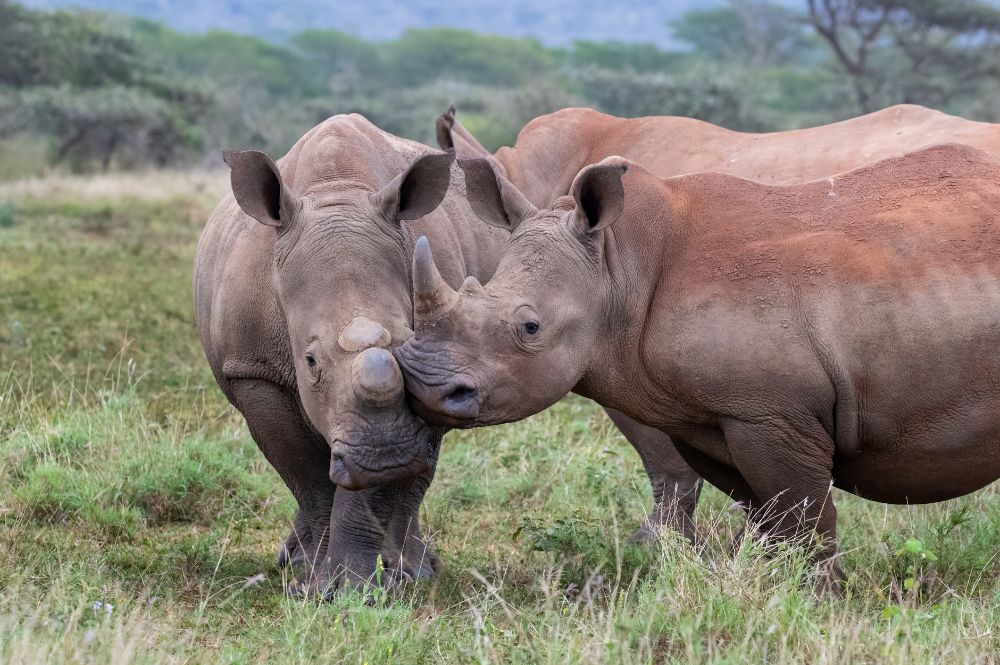At Save the Rhino International, we believe science is essential to guide how best to conserve rhinos. That’s why we’re excited by the findings of a new study published this week in the prestigious academic journal Science which shows that dehorning rhinos played a vital role in significantly reducing poaching across key reserves in South Africa.
The study, led by Dr Tim Kuiper of Nelson Mandela University, analysed data from 11 reserves in the Greater Kruger region between 2017 and 2023. This landscape is a critical stronghold for rhinos, home to approximately 25% of Africa’s remaining rhino population. It has also borne the brunt of the resurgence of poaching pressure since the late 2000s.
Over the seven years of the study (2017-2023), 1,985 rhinos were poached in the landscape. However, in areas where rhinos had been dehorned, poaching rates dropped significantly (2,284 rhinos were dehorned within eight of the 11 reserves). Dr Kuiper explained, “Dehorning rhinos to reduce incentives for poaching was found to achieve a 78% reduction in poaching.”
Traditional security measures such as deploying rangers, helicopters, and surveillance systems, remain fundamental components of protection efforts. However, the study found that despite more than US$74 million being spent on these approaches, they didn’t correspond to the proven drop in poaching rates in the same way as dehorning. Standard anti-poaching approaches are fundamental, however wider systemic factors, including poverty, corruption, and limited capacity within criminal justice systems, shape their effectiveness. As such, conservation efforts must be holistic, investing not only in security but also in community partnerships, law enforcement support, and long-term harmony between people and wildlife.
Dehorning is powerful because is it is proactive, visibly reducing the reward to potential poachers and cannot be undermined by insider information. Experienced reserve managers remain widely recognised as foundational for effective rhino conservation – along with committed and motivated rangers, supported by investment in their welfare, equipment, training and safety.
Though dehorned rhinos can still be targeted for small horn stumps or regrowth, the research underlines the potential of this intervention when applied strategically as part of a broader, integrated approach to anti-poaching.
Dr Jo Shaw, our CEO and a co-author on the study, said: “Dehorning rhinos is not a standalone solution to keep rhinos safe. However, as additional tool , it can make a significant difference. Studies like this are crucial to make sure we know what works, what doesn’t, where best to invest the support which is essential for their conservation and how we adapt to ensure rhinos thrive in the future.”
Rhino conservation faces complex and evolving challenges. With criminal networks constantly shifting tactics and rhino populations under sustained pressure, this study is a timely reminder of the need for evidence-based and adaptive strategies that reflect the realities on the ground. At Save the Rhino, we want to ensure that our efforts are as impactful as possible for rhino conservation and remain committed to supporting smart, effective, and ethical interventions that give rhinos the best possible chance to thrive.
The project was championed by the Greater Kruger Environmental Protection Foundation (GKEPF) as an important collaboration between reserve managers working on the ground and scientists from the University of Cape Town, Nelson Mandela University, the University of Stellenbosch and the University of Oxford. Other partners included South African National Parks, the World Wildlife Fund South Africa, and the Rhino Recovery Fund.
A final note
We would also like to take a moment to honour the life, legacy and leadership of Sharon Haussmann, Chief Executive of GKEPF, who tragically passed away on 31 May 2025 just prior to this article being published and without whom this important work would not have happened. Sharon was an inspirational, passionate, committed conservationist whose work touched the lives of many across the rhino community and beyond. Her unique combination of drive, integrity, and warmth left a lasting mark, and she will be deeply missed. Our heartfelt condolences go out to Sharon’s family, friends, and all those who had the privilege of working alongside her.








